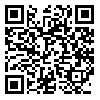Fri, Dec 19, 2025
| فارسی
Volume 7, Issue 2 (Summer 2005)
Advances in Cognitive Sciences 2005, 7(2): 38-45 |
Back to browse issues page
Download citation:
BibTeX | RIS | EndNote | Medlars | ProCite | Reference Manager | RefWorks
Send citation to:



BibTeX | RIS | EndNote | Medlars | ProCite | Reference Manager | RefWorks
Send citation to:
Arabgol F, Alaghbandrad J, Sharifi V, Hakim Shoushtari M, Shaabani A, Davari Ashtiani R, et al . Reliability of a Persian Translation of the Composite International Diagnostic Interview (Cidi), Section for Substance Use Disorders: In a Multi-Center Study in Iran. Advances in Cognitive Sciences 2005; 7 (2) :38-45
URL: http://icssjournal.ir/article-1-137-en.html
URL: http://icssjournal.ir/article-1-137-en.html
Fariba Arabgol *1 
 , Javad Alaghbandrad
, Javad Alaghbandrad 
 , Vandad Sharifi
, Vandad Sharifi 
 , Mitra Hakim Shoushtari
, Mitra Hakim Shoushtari 
 , Amir Shaabani
, Amir Shaabani 
 , Rozita Davari Ashtiani
, Rozita Davari Ashtiani 
 , Zahra Shahrivar
, Zahra Shahrivar 
 , Elham Shirazi
, Elham Shirazi 
 , Homayoun Amini
, Homayoun Amini 
 , Hossein Kaviani
, Hossein Kaviani 


 , Javad Alaghbandrad
, Javad Alaghbandrad 
 , Vandad Sharifi
, Vandad Sharifi 
 , Mitra Hakim Shoushtari
, Mitra Hakim Shoushtari 
 , Amir Shaabani
, Amir Shaabani 
 , Rozita Davari Ashtiani
, Rozita Davari Ashtiani 
 , Zahra Shahrivar
, Zahra Shahrivar 
 , Elham Shirazi
, Elham Shirazi 
 , Homayoun Amini
, Homayoun Amini 
 , Hossein Kaviani
, Hossein Kaviani 

Abstract: (2948 Views)
Objective: To assess the reliability of the Substance Abuse Module of a Persian translation of Composite International Diagnostic Interview (CIDI), in a multi-center study in Iran.
Method: the sample consisted of 101 inpatients and outpatients from five psychiatric hospitals in Tehran. Trained psychologists conducted the interviews. The completed CIDI was administered to 65 subjects and CIDI-substance abuse module (CIDI-SAM) was administered to 36 others. To study the test-retest reliability, a second interview by a different person was administered to all subjects within 3 to 7 days of the first interview. Kappa and Yule’s statistics were used to evaluated reliability.
Results: Overall, the reliability of substance disorder diagnosis was higher for complete CIDI than for CIDI-SAM. In complete CIDI in both diagnostic systems of ICD-10 and DSM-IV, Kappa statistics was 0.5 or higher with a generally higher Yule’s statistics; and opioid dependency had the highest kappa (0.64) among different disorders. In CIDI-SAM, the highest reliability regarding Kappa and Yule results was related to cannabis dependency (Kappa=0.41; Yule=0.6).
Conclusion: Overall, the reliability of complete CIDI for the diagnosis of substance abuse disorders was better than CIDI-SAM. Weak reliability, especially in the Substance Abuse Module, may be due to the method of sampling or the high prevalence of the disorder.
Method: the sample consisted of 101 inpatients and outpatients from five psychiatric hospitals in Tehran. Trained psychologists conducted the interviews. The completed CIDI was administered to 65 subjects and CIDI-substance abuse module (CIDI-SAM) was administered to 36 others. To study the test-retest reliability, a second interview by a different person was administered to all subjects within 3 to 7 days of the first interview. Kappa and Yule’s statistics were used to evaluated reliability.
Results: Overall, the reliability of substance disorder diagnosis was higher for complete CIDI than for CIDI-SAM. In complete CIDI in both diagnostic systems of ICD-10 and DSM-IV, Kappa statistics was 0.5 or higher with a generally higher Yule’s statistics; and opioid dependency had the highest kappa (0.64) among different disorders. In CIDI-SAM, the highest reliability regarding Kappa and Yule results was related to cannabis dependency (Kappa=0.41; Yule=0.6).
Conclusion: Overall, the reliability of complete CIDI for the diagnosis of substance abuse disorders was better than CIDI-SAM. Weak reliability, especially in the Substance Abuse Module, may be due to the method of sampling or the high prevalence of the disorder.
Type of Study: Research |
Subject:
Special
Received: 2005/02/16 | Accepted: 2005/04/22 | Published: 2005/06/22
Received: 2005/02/16 | Accepted: 2005/04/22 | Published: 2005/06/22
Send email to the article author
| Rights and permissions | |
 |
This work is licensed under a Creative Commons Attribution-NonCommercial 4.0 International License. |

